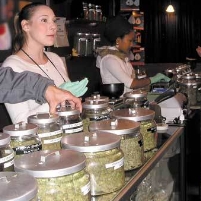Marijuana Debate Goes Mainstream
Thursday, April 16, 2009
 Marijuana Dispensary
Marijuana Dispensary
The economic downturn, coupled with changing social perceptions and escalating drug violence in Mexico, has sparked national interest in legalizing, regulating and taxing marijuana consumption. A 2005 study by Harvard University economist Jeffrey Miro, noted that legalization would save the United States $7.7 billion annually on law enforcement, in addition to generating $6.2 billion in tax revenue. Each year, Americans spend $39 billion on domestically grown marijuana, $9 billion on marijuana from Mexico and an additional $7-10 billion on the crop from Canada.
Longtime advocates for legalization have gained unlikely allies. Most notably, a group of former and current police officers have banded together and formed Law Enforcement Against Prohibition (LEAP). The organization proclaims that, "after nearly four decades of fueling the U.S. policy of a war on drugs with over a trillion tax dollars and 37 million arrests for non-violent drug offenses, our confined population has quadrupled, making building prisons the fastest growing industry in the United States."
The first state to legalize medical marijuana in 1996, California has since engaged in an ongoing battle with the federal government and the Drug Enforcement Administration to stop federal raids of medical marijuana dispensaries. Last month, Attorney General Eric Holder announced a deviation from the previous administration’s drug policy by promising to limit raids to facilities that break both state and federal law.
Offering a creative solution to his state’s mounting deficit and overcrowded prison population, California Assemblyman Tom Ammiano (D-San Francisco) recently introduced a bill that would legalize recreational use of marijuana. At least 37 others states have also begun actively debating reforms to their own drug policies. Although lagging behind state governments, even Congress attempted reform with the introduction of a bill by Representatives Barney Frank (D-MA) and Ron Paul (R-TX) last year that sought to safeguard medical marijuana patients and decriminalize small amounts of possession.
-Adrine Akopyan
An End to the War on Weed? (by Nathan Comp, In These Times)
In Calif, Medical Marijuana Laws are Moving Pot Into the Mainstream (by Karl Vick, Washington Post)
We Tried A War Like This Once Before (by Mike Gray, Washington Post)
Without a Co-Sponsor, Ammiano's Pot Bill Lagging (by Joe Garofoli, San Francisco Chronicle)
An Ex-Drug Smugglers Perspective (by Brian O’Dea, Chicago Tribune)
The Budgetary Implications of Marijuana Prohibition (by Jeffrey A. Miron, Harvard University)
National Drug Threat Assessment (National Drug Intelligence Center, Department of Justice) (PDF)
Drug Enforcement Administration (AllGov)
- Top Stories
- Unusual News
- Where is the Money Going?
- Controversies
- U.S. and the World
- Appointments and Resignations
- Latest News
- Trump to Stop Deportations If…
- Trump Denounces World Series
- What If China Invaded the United States?
- Donald Trump Has a Mental Health Problem and It Has a Name
- Trump Goes on Renaming Frenzy






Comments